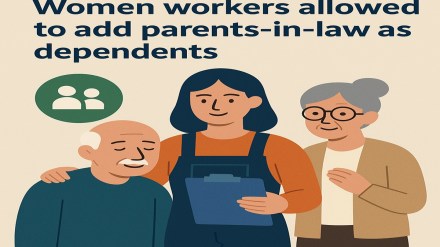After a long wait, India finally got its labour laws reformed through rationalisation of 29 existing laws into 4 new Labour Codes. These four Codes are – the Code on Wages, 2019, the Industrial Relations Code, 2020, the Code on Social Security, 2020 and the Occupational Safety, Health and Working Conditions Code, 2020 are being made effective from 21st November 2025. The new rules have been made effective from November 21, 2025.
Under the Code on Social Security, 2020, the government has introduced one of the most inclusive reforms for working women — a provision that allows female employees to include their dependent parents-in-law in the definition of “family”. This widens dependent coverage, strengthens social security, and recognises the caregiving responsibilities often shared by women.
Expanded definition of dependents under Labour Code
Under the new labour laws, the coverage has been extended to maternal grandparents, and in the case of female employees, it also includes dependent parents-in-law, broadening family benefit access.
A modern labour framework with a strong focus on women workers
The government has notified the four Labour Codes. These reforms aim to create fairer, safer, and more inclusive workplaces while bringing parity across industries.
Women workers: stronger rights, better protection
The new Labour Codes include several women-focused provisions designed to support equal opportunities, safety, and representation:
-Gender discrimination is legally prohibited, strengthening workplace equality.
-Equal pay for equal work is guaranteed.
-Women can now work night shifts and in all categories of work — including underground mines and heavy machinery — subject to their consent and mandatory safety measures.
-Women’s representation in grievance redressal committees has been made compulsory.
-And most notably – the provision allowing addition of dependent parents-in-law in the family definition marks a major step toward gender-inclusive policy design.
These measures collectively aim to remove structural barriers and help women workers access opportunities without compromising safety or social security.
Reforms for India’s diverse workforce
While the reforms bring important protections for women, they also significantly improve the working conditions of fixed-term employees, contract workers, gig/platform workers, youth workers, and MSME workers.
- Fixed-Term Employees (FTE): Equal status, greater security
For the first time, fixed-term workers have been placed on par with permanent employees:
-They will receive all benefits available to permanent staff — including leave, medical benefits, and social security.
-Gratuity eligibility after just one year (earlier it required five years).
-Equal wages as permanent workers.
-Encourages direct hiring and reduces the overuse of contractual labour.
- Gig & Platform Workers: Recognised and protected
Gig and platform workers — such as drivers, delivery partners, and on-demand service providers — are formally recognised for the first time.
Clear definitions have been introduced for ‘gig work’, ‘platform work’ and ‘aggregators’.
Aggregators must contribute 1–2% of annual turnover (capped at 5% of payments to gig workers) toward their welfare.
Aadhaar-linked Universal Account Number ensures fully portable benefits across states — crucial for a migratory workforce.
This marks India’s first attempt at building a welfare net for digital-economy workers.
- Contract workers: Health, security and fair treatment
The Codes aim to reduce exploitation and ensure better protection:
-FTE norms will uplift contract workers by ensuring equal benefits as permanent employees.
Gratuity after one year of continuous service.
-Principal employers will now be responsible for health and social security benefits.
-Workers will be entitled to a free annual health check-up.
- Youth workers: Stability, dignity and fair wages
Young workers entering the job market gain several protections:
-Minimum wage guaranteed for all workers.
-Every worker must receive an appointment letter, creating employment records and improving social security.
-Worker exploitation is prohibited; wage payment during leave is mandatory.
-Workers will receive wages according to the floor wage set by the Central Government.
This helps ensure stable income and a dignified standard of living for youth across sectors.
- MSME Workers: Essential protections for India’s backbone sector
The Codes extend strong worker protections to employees of MSMEs — the largest employment generator after agriculture.
All MSME workers are covered under the Social Security Code, 2020, based on employee count.
Minimum wage guaranteed for all.
Workers will get access to canteens, drinking water, rest areas, and other basic facilities.
Standard working hours, double overtime wages, and paid leave have been mandated.
Timely wage payment is ensured.
These reforms strengthen labour welfare within the MSME ecosystem while supporting ease of doing business.
A new era for India’s workforce
The four Labour Codes mark one of the biggest overhauls of India’s labour framework since Independence. By redefining dependents to include parents-in-law for female workers, prohibiting discrimination, strengthening safety rules, recognising gig workers, and improving the rights of contract, youth, and MSME workers, the Codes aim to create a modern, equitable, and inclusive labour environment.
The government hopes that these changes will not only improve working conditions but also help industries build a more productive, secure, and future-ready workforce.
